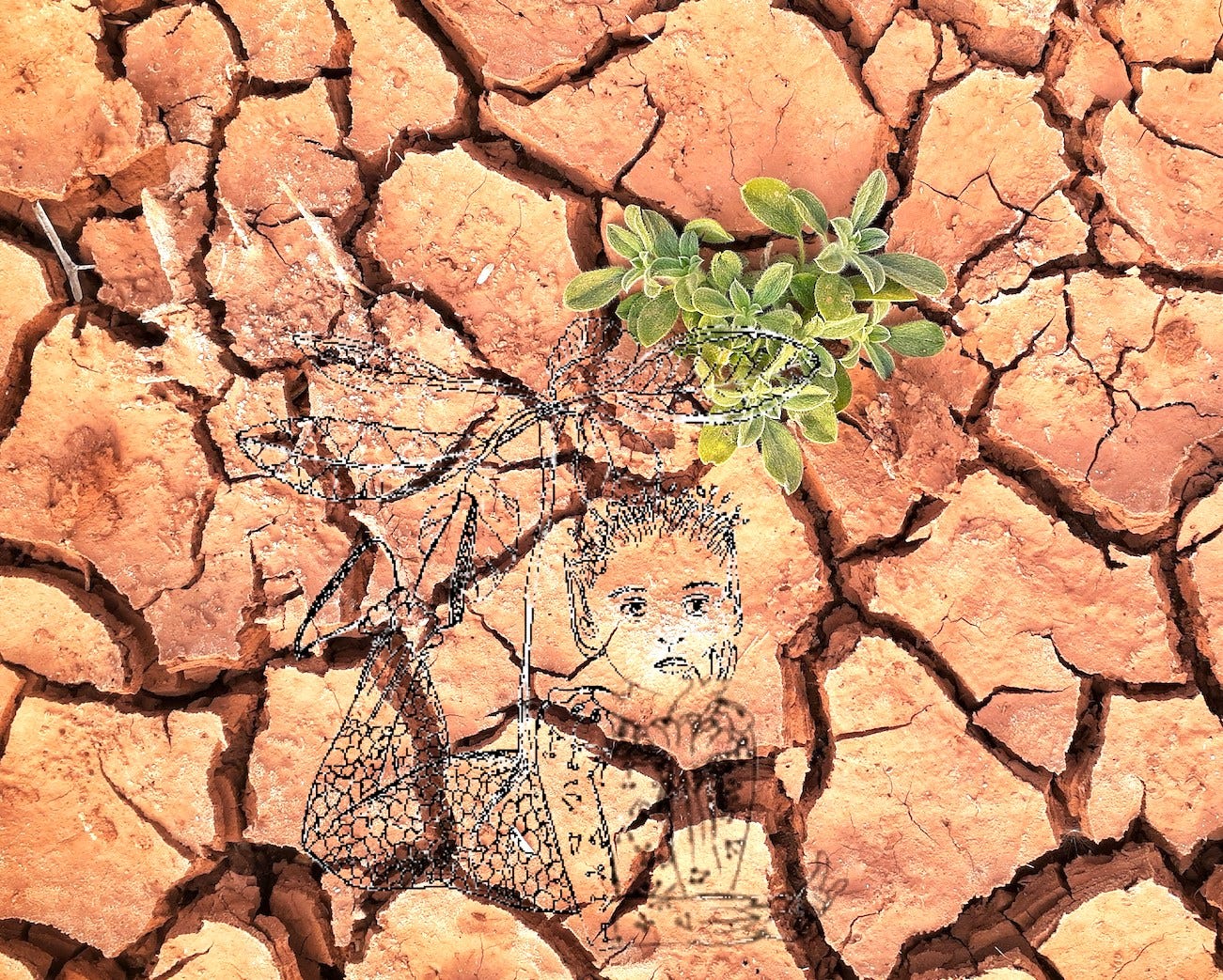Dancing into the Cracks
catching out con-words for the sake of togethering into the Symbiocene
It seems like things want to fall apart.
It seems like we’ve been stolen from home.
Where do you go when things fall apart,
when home has been taken away from you,
when the cracks appear?
〰 Bayo Akomolafe 〰
Anthropocene ::: a Brief History of Verboklepsy
I know the world will survive us ~
and in some ways it will be more alive.
〰 John Green 〰
The current era of human history is sometimes called Anthropocene, the ‘Age of Man’.
All previous word composition with -cene [from Greek kainos = era] ~ for example Miocene, when the Alps and Himalayas were formed, and Pleistocene, when glacial periods caused extinction of many species ~ referred to geological forces which literally changed the face of the earth.
Whoever came up with the term Anthropocene, they used it in a satirical way. The word came with an implicit undertone of disapproval. Some say it was used in a scornful, condescending manner. Who knows… that’s all hearsay now…
We do have it from good authority, however, that Anthropocene was meant to highlight the fact that mankind has become so destructive for Mother Earth.
Anthropocene was meant to highlight the fact
that mankind has become destructive for Mother Earth.
This information comes straight out of The Myth of Human Supremacy written by Derrick Jensen, American ecoactivist, author, and founder of an organisation called Deep Green Resistance
“It didn’t take long for human supremacists to turn the term (Anthropocene) into the sort of self-congratulatory rationalization for further destruction to which we have become so accustomed,” Jensen writes.
He also clarifies that human nature in general is not to blame for all this destruction. It’s not because ‘humans have a destructive gene’. The cause lies in specific beliefs and behaviours of some individuals.
“The term Anthropocene not only doesn’t help us stop this culture from killing the planet, it contributes directly to the problems it purports to address.” Jensen explains. “It’s also grossly misleading. Humans aren’t the ones »transforming«— read: killing—the planet. Civilized humans are.”
This explanation made us* stumble. Civilised humans?!
Perhaps Derrick Jensen doesn’t identify as a ‘civilised human’. He calls himself an ‘environmentalist in the anarcho-primitivist tradition’.
But what about us*? What if we* identify as ‘civilised humans’?
* the pronouns us/we/our in this wordcast refer to me, the author as a symbiont together with her words, and Word⚘Fairies, plus, some likeminded fellow humans, whoever may read and identify with this symbiocentric group.
We are not killing the planet. Anthropocentrists appear to be doing so. Perhaps certain ‘supremacist humans' can be blamed for the destruction…
Some individuals are clinging to power, for whatever reasons. They look vaguely like us. But they don’t think, feel, or behave like us ~ civilised symbiocentric humans who love this planet and care about Mother Earth.
They are anthropoids who have become convicts to propagandist catchphrases e.g.:::
::: Make nature your slave
::: I think therefore I am
::: Technology can solve all problems
Having said that, we don’t want to fall into the same old trap and pass the buck to ‘those supremacists’… while othering ‘Anthropocentrists’.
That kind of attitude instantly brings out the ’supremacist within’, which is the last thing we want to do, especially if we want/need to move into the new era called the Symbiocene (the term was coined by ecophilosopher
)Con-words ::: Words with Stolen Identities
Confusion is a word we have invented for an order we have not understood.
〰 Henry Miller 〰
The Symbiocene is rooted in the evolutionary processes of symbiogenesis. Collective activities like collaborating, communicating, connecting, cooperating etc. are essential to usher in this new era.
Because words are our symbionts, the way we use our language can either obstruct or nurture such activities.
Contemporary English words with the Latin prefix co-/ col-/ com-/ con- are particularly vulnerable and need special attention in this context. Many of them have been distorted and hijacked in the Anthropocene. They have become victims of identity theft ~ a.k.a. verboklepsy.
Con (and its variations) is a collective pheme (= grammatical unit). It is one of the word elements used to indicate gathering, togethering, combining, joining forces.
In the English language, many con-words have developed a life of their own, which no longer serves the original intention. Examples chosen for this wordcast
conceit
concrete
condescend
confidence
confound
confuse
conspire
Conceit [from Latin com = together + capere = catch] the noun conceit appeared the English language in the late 14th century. It was formed from the verb conceive (= to become pregnant) and originally meant a new thought, witty notion, i.e. a ‘mental pregnancy’.
Conceit (originally used as a noun and verb) was the forerunner of the words concept, conception, mentally conceive, conceptualise.
The contemporary use of the words conceit (= excessive pride) and conceitedness (= arrogant concept of one's own achievements or virtues) developed around 1600.
During the same period the word concept was coined to replace the original use of conceit.
Concrete [from Latin con- + crescere = to grow] originally to grow together. Referring to something that grew and developed and eventually materialised in solid form through a process of symbiogenesis.
Originally used as a logician’s term (concrete as opposed to abstract), the meaning expanded and grew into ‘anything material’. Concrete as a ‘building material cemented together from sand, gravel, stone chips, and water’ became known in the 1830s.
In the 1950s, some Brazilian poets went a step further and developed the concept of concrete poetry, which gave birth to a new artistic movement.
Concrete art influenced many writers and artists of the 20th century, including James Joyce, E.E. Cummings, and Piet Mondrian. It continues to inspire digital and multimedia artists.
Condescend [from Latin com + descendere = to climb down] entering the English language in the mid 14 c., condescend originally referred to a king or person of superior power to step down from their rights or claims and voluntarily assume an equal position with inferiors.
Condescension was a gracious act to ‘waive ceremony or dignity proper to one's superior position or rank’ to make a concession to people of lower rank.
Condescending carried its positive meaning until it flipped into its opposite sense in the late 18 c.
Now condescend means to flaunt one’s privileges and status, to demonstrate superiority and use one’s power by making other’s feel smaller and less important.
Incidentally, the change of meaning of condescend, evolved in parallel with patronise. Once used in the sense of “to act as a patron, to assist and sponsor e.g. an artist” (1580s), the meaning has shifted (since 1797) into “to treat in a condescending way.”
Confidence [from Latin com + fides = trust] 1400, assurance, belief in the goodwill of others, firm trust.
From 1550s ~ reliance on one’s own powers and resources, self-assurance
From 1590s ~ secret, private communication (confidant, confide, confidential, confidentiality)
1849 American English introduced the title confidence man (= swindler, scammer), abbreviated to con man in 1889. In these compositions confidence is used in the sense of putting on a fake mask of confidence, in full trust that others will fall into the trap of the scam.
Confound [from Latin com + fundere = to pour] used in English since 1300 c in the sense of “to condemn, curse, destroy utterly.” The original Latin confundere (= bring into disorder by mixing things together) ~ related especially to mental perception and senses ~ was synonymous with imprecate (= to invoke evil by cursing sth. or someone).
In the 1550s the word confuse (from the identical Latin roots) was adopted in English. Originally used in the sense of ‘mixing things or ideas together into one homogenous mass,’ its meaning gradually blended with confound. Both verbs were literally poured from the same source.
In contemporary anthropocentric English, confound is used as a tactics to ‘throw enemies off track’, to mix up and increase confusion, to defeat or frustrate someone’s efforts by throwing obstacles into their path.
Conspire [from Latin com + spirare = to breathe] late 14 c. to agree, unite, plot, plan a malicious or criminal act in secret.
Conspiracy, mid 14 c., the English noun, used in the sense of plotting evil, is already a considerable deviation from the original Latin conspiratio = agreement, union, unanimity.
Conspiracy theory, introduced in 19c. in the non-pejorative, neutral sense “the theory that a certain conspiracy exists.”
The current and distorted meaning, “explanation of an event or situation involving unwarranted belief that it is caused by a conspiracy among powerful forces” emerged in mid 20 c.
In recent political /polemic jargon, conspiracy theory/ conspiracy theorist are used to great effect with the intention to cover up actual ‘concrete’ conspiracies. In the same breath, their usage blocks all questioning or any critical commentary, while killing off alternative suggestions and opportunities for constructive conversation.
Inadvertently, this particular verboklepsy has become a stunning illustration for the power of words.
Togethering ::: Moving Into the Symbiocene
Alone we can do so little; together we can do so much.
〰 Helen Keller 〰
In the Symbiocene, all con-words need to be reassessed, and potentially redefined, to rekindle their original identities and purpose ~ to nurture the process of togethering.
Together [from Old English to = towards + gœdere = to unite, join] expresses the gathering of forces so that a person, or group, or population of a symbiotope can move in unity and synchrony.
In the symbiosphere this is a common and perfectly natural event. Symbiogenesis implies togethering.
Togethering is a verb. It captures not only the process of uniting forces but also the relationship between the symbionts within the symbiosphere. Togethering grants the strength of the group to the individual and vice versa.
When original definitions of words are corrupted, when terms are used in a drastically different sense, the phemes themselves don’t lose their meanings.
Rootwords always remain the original roots. They carry the identity and history of a verbiont within them. If a word is used in a new sense which distorts or reverses the original meaning, and if this process is not made transparent, that effectively becomes identity theft.
To help our words recover from anthropocentric corruption, the symbiophants at Symbiopædia have welcomed a dedicated Word⚘Fairy.
Eigen⚘Leben [from German eigen = own + Leben = life] lives in the wildwordwoods to promote the healthy development of con- and other verbionts to recollect their roots and follow their own path into the Symbiocene.
Do not pray exclusively to the ancestors of the land;
make room also for the spirits of the fault line,
the new gods that scream through cracks
with musical notes of worlds to come.
〰 Bayo Akomolafe 〰
quotes by Bayo Akomolafe from We will Dance with Mountains: Into the Cracks








Such a soothing "rootcast," Veronika:"to nurture the process of togethering.".
Your role as a medium between words and the world is very much appreciated. As people who enjoy writing, we hope to nurture our outer world.
I am thinking about how reality shows us the amount of work we do inward and how, as a civilization Anthropocentrists, we end up using "Words with Stolen Identities." The outer world (words and actions) is a reflection of our inner reality.
Krishnamurti points out:
“What you are inwardly will eventually manifest itself outwardly. If you are inwardly violent, aggressive, ambitious, that will project itself in your relationships and in the society you build around you.”
Love this word fairy: Eigen⚘Leben. Thank you for all the magic!
Wonderful word sleuthing Veronika.
It is amazing to see so many words and meanings hijacked in the Anthropocene. It’s not even the same language that we started with. “Confluence” is symbiogenesis. I’d love to see your take on “consciousness”. I enjoy it here in the hermeneutic togetherness of the Symbiocene.🙏❤️